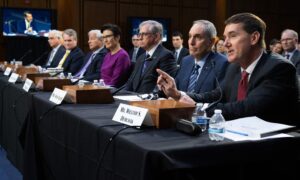US Banks Lost Nearly $1 Trillion in Deposits Since Recent Peak

Small banks, in particular, are losing deposits to money-market funds at an alarming pace. The month of March 2023 witnessed the fastest withdrawal of funds from commercial banks in U.S. history.
According to data released by the Federal Reserve, a staggering $360 billion was withdrawn from banks across the country in the last month alone. To put this into context, not a single monthly decline in 2008 exceeded $100 billion. The recent withdrawals have dwarfed those of the past, bringing total bank deposits down by almost $1 trillion since the highs in April 2022.
Data from Bank of America show a commensurate surge in money-market fund assets over the last few months. Money-market funds invest in short-term debt—often government bonds—to earn yield while offering a highly liquid.
Many are speculating that the recent bank scares are causing depositors to look for safer alternatives, finding solace in debt backed by the U.S. Treasury—an institution which has never defaulted.
“Who wants to make 0.3 percent with a bank account when you can make 5 percent in a money-market fund?” wrote Genevieve Roch-Decter, founder of Grit Capital, on Twitter Monday morning.
Over the past week, the 10-year Treasury bond yield decreased by more than 10 basis points. U.S. government bonds across the duration spectrum saw an uptick in demand over the previous seven days, a sign that investors are looking for safety.
According to JPMorgan analyst Nikolaos Panigirtzoglou, around $7 trillion of the total $17 trillion deposits remain uninsured, which could be behind the capital flight into government bonds and money market funds. Despite the perceived safety offered by U.S. Treasurys, Panigirtzoglou argued the poor performance of bonds throughout 2022 is largely to blame for today’s banking crisis.
The Federal Reserve “rate hikes have been inducing a deposit shift via another channel: via creating losses in banks’ bond portfolios, which in turn made depositors less comfortable with keeping uninsured deposits in banks with large unrealized losses on their bond holdings,” he wrote in an investor note last week.
Some have posited that the blame goes back farther, and is rather a consequence of decades of loose monetary policy by the Federal Reserve.
The “Kobeissi Newsletter” stated in its Monday issue that the unprecedented bank withdrawals are “the product of ‘free’ money and zero percent interest rates.” While these policies were implemented to stimulate the economy and mitigate the effects of the pandemic, their long-term consequences are now becoming apparent.
Investors are seeking safer havens for their money, as they attempt to protect their wealth from the potential fallout of inflation and instability.The Treasury Department and Federal Deposit Insurance Corporation (FDIC) have yet to commit to a temporary deposit guarantee—as many investors and market pundits have called for.
Steve Hanke, a former economic advisor to the Reagan administration, told The Epoch Times that the government should not bail out failing banks.
“Depositors with over $250,000 on deposit thought that they were uninsured, and they were willing to take the risk,” he said. “Why should they now be rewarded with a bailout gift from the government?”




